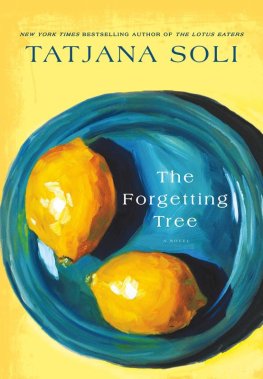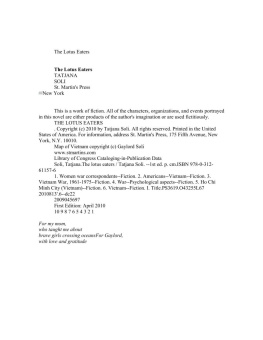Tatjana Thelen - Stategraphy (Studies in Social Analysis)
Here you can read online Tatjana Thelen - Stategraphy (Studies in Social Analysis) full text of the book (entire story) in english for free. Download pdf and epub, get meaning, cover and reviews about this ebook. year: 2017, publisher: Berghahn Books, genre: Politics. Description of the work, (preface) as well as reviews are available. Best literature library LitArk.com created for fans of good reading and offers a wide selection of genres:
Romance novel
Science fiction
Adventure
Detective
Science
History
Home and family
Prose
Art
Politics
Computer
Non-fiction
Religion
Business
Children
Humor
Choose a favorite category and find really read worthwhile books. Enjoy immersion in the world of imagination, feel the emotions of the characters or learn something new for yourself, make an fascinating discovery.

- Book:Stategraphy (Studies in Social Analysis)
- Author:
- Publisher:Berghahn Books
- Genre:
- Year:2017
- Rating:3 / 5
- Favourites:Add to favourites
- Your mark:
- 60
- 1
- 2
- 3
- 4
- 5
Stategraphy (Studies in Social Analysis): summary, description and annotation
We offer to read an annotation, description, summary or preface (depends on what the author of the book "Stategraphy (Studies in Social Analysis)" wrote himself). If you haven't found the necessary information about the book — write in the comments, we will try to find it.
Stategraphy (Studies in Social Analysis) — read online for free the complete book (whole text) full work
Below is the text of the book, divided by pages. System saving the place of the last page read, allows you to conveniently read the book "Stategraphy (Studies in Social Analysis)" online for free, without having to search again every time where you left off. Put a bookmark, and you can go to the page where you finished reading at any time.
Font size:
Interval:
Bookmark:
STATEGRAPHY
Studies in Social Analysis
General Editor: Martin Holbraad
University College London
Focusing on analysis as a meeting ground of the empirical and the conceptual, this series provides a platform for exploring anthropological approaches to social analysis while seeking to open new avenues of communication between anthropology and the humanities, as well as other social sciences.
Volume 1
Being Godless: Ethnographies of Atheism and Non-Religion
Edited by Ruy Llera Blanes and Galina Oustinova-Stjepanovic
Volume 2
Emptiness and Fullness: Ethnographies of Lack and Desire in Contemporary China
Edited by Susanne Bregnbk and Mikkel Bunkenborg
Volume 3
Straying from the Straight Path: How Senses of Failure Invigorate Lived Religion
Edited by David Kloos and Daan Beekers
Volume 4
Stategraphy: Toward a Relational Anthropology of the State
Edited by Tatjana Thelen, Larissa Vetters, and Keebet von Benda-Beckmann
Volume 5
Affective States: Entanglements, Suspensions, Suspicions
Edited by Mateusz Laszczkowski and Madeleine Reeves
Volume 6
Animism beyond the Soul: Ontology, Reflexivity, and the Making of Anthropological Knowledge
Edited by Katherine Swancutt and Mireille Mazard
Toward a Relational Anthropology of the State
Edited by
Tatjana Thelen, Larissa Vetters, and Keebet von Benda-Beckmann

First published in 2018 by
Berghahn Books
www.berghahnbooks.com
2018 Berghahn Books
Originally published as a special issue of Social Analysis , volume 58, issue 3.
All rights reserved. Except for the quotation of short passages for the purposes of criticism and review, no part of this book may be reproduced in any form or by any means, electronic or mechanical, including photocopying, recording, or any information storage and retrieval system now known or to be invented, without written permission of the publisher.
Library of Congress Cataloging-in-Publication Data
Names: Thelen, Tatjana, editor. | Vetters, Larissa, editor. | Benda-Beckmann, Keebet von, editor.
Title: Stategraphy : toward a relational anthropology of the state / edited by Tatjana Thelen, Larissa Vetters, and Keebet von Benda-Beckmann.
Description: New York : Berghahn Books, 2017. | Series: Studies in social analysis | Includes bibliographical references and index.
Identifiers: LCCN 2017014899 (print) | LCCN 2017037523 (ebook) | ISBN 9781785337017 (ebook) | ISBN 9781785336997 (hardback : alk paper) | ISBN 9781785337000 (pbk. : alk. paper)
Subjects: LCSH: Political anthropology. | State, The.
Classification: LCC GN492 (ebook) | LCC GN492 .S74 2017 (print) | DDC 306.2dc23
LC record available at https://lccn.loc.gov/2017014899
British Library Cataloguing in Publication Data
A catalogue record for this book is available from the British Library.
Tatjana Thelen, Larissa Vetters, and Keebet von Benda-Beckmann
Larissa Vetters
Vincent Dubois
Rebecca Kay
Alice Forbess and Deborah James
Rosie Read
Tatjana Thelen, Andre Thiemann, and Duka Roth
tefan Dorondel and Mihai Popa
Gyngyi Schwarcz and Alexandra Szke

Stategraphy: Relational Modes, Boundary Work, and Embeddedness
Tatjana Thelen, Larissa Vetters, and Keebet von Benda-Beckmann
While the state had been a recurrent theme in anthropology (Bouchard 2011), the 1990s saw a new wave of interest in it. The efflorescence of the new ethnography of the state has cast a spotlight on certain issues, while others have received less attention. Significantly, there has been a marked shift toward state images and representations in research and theorizing. In response, Anthony Marcus (2008) launched a fulminant critique against this development, which he described as the emergence of an orthodoxy in (Anglophone) anthropological state theory. According to him, emphasizing the plurality of culturally constructed state representations without much reference to either power relations or larger social scientific discussions amounts to mere empiricism. We agree with Marcus that much of the recent anthropological literature has overemphasized cultural constructions, images, and discursive representations of the state, which, moreover, are often presented in a peculiarly monomorphic manner. The topic of state practicesperhaps more pronounced in European discussionshas not received appropriate attention in the strand of literature criticized by Marcus. More important, however, we believe that this development has resulted in a problematic theoretical void between state images and practices. The missing link makes it difficult to understand how specific state constellations and boundaries emerge and are reproduced or dissolved.
In this introduction, we propose a relational anthropology of the state as a way to bridge the gap between images and practices. While acknowledging that anthropologists have often stressed the embeddedness of the social phenomena they research, we argue that this has not yet been fully explored in the analysis of the state. Making relations the starting point of analysis can offer new insights into the workings of the state. We advance our argument in four interrelated sections.
First, we examine in greater detail the emergence of the analytical gap between state images and practices. This section does not intend to provide a comprehensive overview of the development of the anthropology of the state; instead, we focus on embedding the anthropological discussion within the wider domain of social scientific theorizing. Based on this analysis, we, secondly, outline the proposed relational approach, which we call stategraphy. This section includes a working concept of the state and proposes three axes of analysis, namely, relational modalities, boundary work, and embeddedness of actors. Together they lay the foundation for the contributors individual stategraphies, which we describe in the third section. All of the chapters in this book focus on social relations that simultaneously condition and emerge around one central field of state action, namely, welfare services. These redistributive relations constitute a crucial setting where state images and practices converge in the interactions of officials and other citizens. Although not the only possible entry point for a relational analysis, welfare services are especially suited to observe mechanisms of inclusion and identification, as claims and decisions are made about who belongs to a given community and who will have access to limited public resources.
The last part highlights how, read together, the collected chapters contribute not only to an understanding of the variety of constructions of the state but also to broader comparative topics. While many recent ethnographic studies of the state have concentrated on how the history of European state formation provided a powerful ideal for statehood in Africa, Asia, and elsewhere, the contributions in this volume concentrate on Eastern and Western Europe as well as Russia. The demise of socialism has called into question the former self-ascription of state functions and furthered the global hegemony of neo-liberal ideas that has also deeply affected Western European welfare practices. This development has included ideas about necessary state withdrawal from service provision and the introduction of new regulatory frameworks, turning the provision of welfare into important sites where the state redefines itself. Nevertheless, the Cold War dichotomy has not yet vanished (Chari and Verdery 2009), which leads to an often separated treatment of former socialist and capitalist states. Instead of taking the difference for granted, this book examines both post-socialist and post-welfare states as relational settings that demonstrate the fluidity and transformation of state structures, while simultaneously insisting on the particular historicity of each case. Thus, apart from the more general comparative conclusions that can be drawn from the relational approach, this volume seeks to contribute to a postCold War ethnography of the state.
Next pageFont size:
Interval:
Bookmark:
Similar books «Stategraphy (Studies in Social Analysis)»
Look at similar books to Stategraphy (Studies in Social Analysis). We have selected literature similar in name and meaning in the hope of providing readers with more options to find new, interesting, not yet read works.
Discussion, reviews of the book Stategraphy (Studies in Social Analysis) and just readers' own opinions. Leave your comments, write what you think about the work, its meaning or the main characters. Specify what exactly you liked and what you didn't like, and why you think so.










